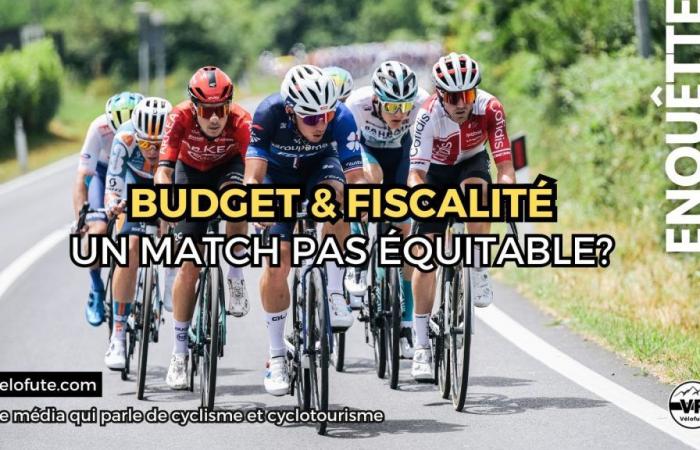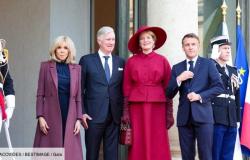Salary, employer contributions, tax rates: with a social and tax system specific to France, the leaders of French cycling teams denounce unfair competition from other foreign teams. Myth or reality? Analysis.
« We are not on the same equal footing because of the social model. We employ everyone as employees, which results in 40 to 42% of employer contributions, then 21% of salary expenses. Obviously, this creates differences with certain foreign teams who pay their riders independently. This is the specificity of the French model and there is nothing we can do about it. ». What consist of Vincent Lavenu in our columns at the start of the year is crystal clear, and it is shared by Cedric Vasseur or even Marc Madiotwho did not say anything else at the end of 2023. Emmanuel Hubert also made a new declaration to this effect last Saturday. All denounce the inequality of the system with other foreign teams. According to them, French teams suffer from a significant competitive disadvantage against foreign teams, who do not fight with the same weapons or the same means. So we asked ourselves the question: is the French tax regime so disadvantageous for French teams?
It’s an old sea serpent: France would be world tax champion. This would impact the competitiveness of French companies, and therefore of sports teams in the broad sense, which operate in a globalized market. This problem goes far beyond the cycling sphere, and already in 2004, the Senate looked into the question in an information report entitled “what arbitrations for French professional football? “. By looking into the case of the round ball, the Senate found “ interesting to focus on the overall question of French singularity in terms of compulsory deductions. It is that of the tax competitiveness of the ‘economic area in France’, but also of the phenomena of tax competition in Europe “. In this report, the Senate attempted to estimate the total cost for a club of paying a player’s salary after income taxes and social security contributions. The table below calculates the costs of paying a net income of €1.8 million per year, for a “ player with international status », in 2004.
The cost of an international player would therefore be 1.5x higher in France than in other European countries. The Senate specifies that this difference is less significant for a player with a lower income, and would amount to around 30%.
French teams spend 1.5 times more than a foreign team to pay the same net salary
This analysis specific to football can be perfectly transposed to cycling, since the tax systems have not fundamentally changed and the current salaries of cyclists are probably in the same order of magnitude as those of footballers in 2003. But in addition to tax systems and social systems perceived as disadvantageous, some foreign teams go further. They do not pay their riders but recruit them as independent workers. This means that riders have their own company, billing their employer who pays the invoice amount without having to add social security or employer contributions. This is particularly the case for Ineos Grenadiers, UAE Emirates Team and Red Bull-Bora-Hansgrohe. The boss of the German team explained it to us last July: “ When we moved to the World Tour in 2016, we contacted the German and Austrian authorities. The Austrians were more direct and offered to pay our riders as self-employed. The justification they gave us was that the runners do not use a specific training site, they do not live in Austria, so we had this option. But of course they don’t have any social security or retirement insurance “. A far from trivial element, we will see it later.
But in concrete terms, these differences in remuneration and taxation systems have a fairly significant impact on the budgets of professional cycling teams. If we take a starting budget of €25 million, which more or less corresponds to the median budget of World Tour teams in 2024, we realize that there are major differences between a French team like Decathlon-AG2R La Mondiale or a team like Red Bull-Bora-Hansgrohe. See the results instead:
If we summarize, with equal budget and payroll, French teams can pay on average €207,000 in net annual salary per rider, or €106,000 less than a foreign team like Red Bull-Bora-Hansgrohe. In other words, French teams must pay 1.5 times more money to offer the same net salaries as a team like Red Bull-Bora. A huge difference which is in line with Vincent Lavenu’s observation: “ French teams can’t afford to pay riders like Pogacar, Vingegaard or Van der Poel, but that’s how it is “. At least in appearance.
The counter-example of the Belgian teams
Because this observation must be qualified. On the one hand, not all foreign teams operate like Red Bull-Bora or Ineos. The Belgian teams, in particular, 3 in number in the World Tour and soon 4 with Lotto-Dstny, also pay their riders. “ All of us runners are employees, and in concrete terms, the system of employer and social contributions is very similar to the French system. », explained Stéphane Heulot, director of the Belgian Pro Team, upon the arrival of Paris-Tours, even mentioning a “ fake complex » from his French counterparts. Indeed, the figures seem to prove the former Saur-Sojasun man right, since according to one EY study on European taxationthe rate of charges (employer contributions, income tax and VAT) for a French employer would be 54.5%, compared to 53.5% for a Belgian employer. A minimal difference which contradicts Lavenu’s argument that a French team cannot afford to pay stars.
However, the last one, Mathieu Van der Poel, has always been linked since his beginnings to Alpecin-Deceuninck, a Belgian team. Here, a mechanism specific to cycling is taken into account: the payment of salary via the sponsor and not the team. “ It’s no secret that bike manufacturers Specialized paid the majority of Peter Sagan’s salary, estimated at €5 million in 2021. However, it is not certain that Peter Sagan’s income is included in the budget of the Bora-Hansgrohe team, which reportedly amounts to €18 million », explains Daam Van Reeth in his article The finances of professional cycling teams (2024). A lever that could a priori activate a sponsor like Decathlon to associate itself even more strongly with the image of a leading rider in the peloton. Groupama or FDJ could have been inspired to retain Lenny Martinez, poached by Bahrain Victorious with a real golden bridge.
The social system is an asset for French cycling teams
Finally, social protection benefits seem to be attractive to runners. Some agents contacted mentioned the significant impact of the social system in contract negotiations for riders. An argument that was already put forward Marc Madiot for The Team in 2017: « we offer much better job security. At home, when you are injured or sick, you continue to receive your salary. This is not always the case elsewhere. »
The frustration of French team directors is legitimate, as the difference in tax and social regime can be significant with certain foreign teams. However, it remains an exaggeration to speak of unfair competition when we compare with the Belgian teams, with a very similar system, and which nevertheless employ stars like Mathieu Van der Poel or Remco Evenepoel. Levers exist to counter these differences and the French social protection model is attractive for certain runners. It is up to the French teams to take inspiration from this to recover. on an equal footing », as Lavenu said.






